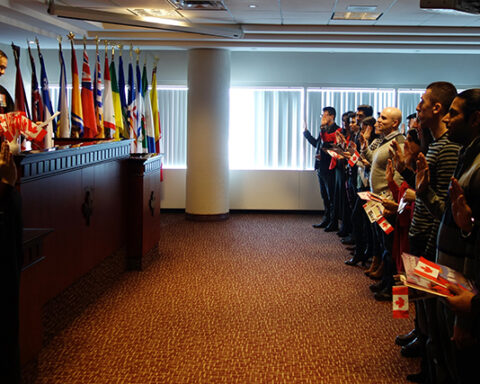Immigrants to Canada are led to believe that acquiring Canadian citizenship comes at little cost, and that’s perhaps why we have one of the highest rates of naturalization in the world. The government itself acknowledges that its policy of multiculturalism has served as an incentive for immigrants to adopt Canada’s “inclusive citizenship.”
It therefore comes as a surprise that the government is discouraging dual nationals from voting in elections where Canada is an overseas riding (or “constituency”) for another nation. It’s a bit complex, but despite the arcane details of this rather strange caveat to dual citizenship, there is a fundamental principle at stake that is worth fighting for.
The latest instance of this conundrum was reported by the Globe and Mail in the context of the recently concluded elections to the French National Assembly. Canada is part of a riding assigned to North America, from where candidates fight for a seat representing the French diaspora – 57,000 French citizens in Canada. As Cyrille Giraud, a Canadian from Montreal, who was among the candidates vying for the seat, was quoted as saying, “It wasn’t a problem in the United States. No problem in China, in Iran, in Korea.”
That surely flies in the face of the much-vaunted “inclusive citizenship” that Canada offers. In contrast, the U.S. is far more restrictive and generally asks that any citizen taking on another nationality to give up the American passport. Canada is among the 90-odd nations that value dual nationals as bridge-builders and global citizens who define a post-modern world.
Last October, the government had similar reservations about citizens of Tunisian origin voting as part of an overseas diaspora for a seat on the country’s constituent assembly, in the wake of a democratic revolution that overthrew an entrenched dictator. In this instance, the reluctance to support this franchise was even more perplexing because the Tunisian-Canadians were voting for a short-lived assembly whose only job was to draft a constitution to sustain a fledgling democracy – a process that Canada supports ardently.
Imagine the honour of having a Canadian who left a lasting imprint on Tunisia’s constitution.
The new restrictions were apparently outlined in a missive to foreign missions in Ottawa last fall and are designed to protect Canadian sovereignty. Ottawa does not appear to have a problem with absentee ballots, that is, citizens of other countries voting as non-resident nationals in foreign elections, but is averse to campaigning and hustings on Canadian streets. Those streets are seemingly reserved for campaigns fought within Canada’s borders.
Essentially, Canada cannot be part of a foreign country’s electoral riding.
While there is broad support for educating new Canadians about the obligations that come with citizenship – and not just the rights and privileges – there is also an expectation that Canada will not come in the way of citizens availing of their adult franchise for foreign nations. Of course, there are larger questions of allegiance and loyalty, but not allowing citizens to vote in foreign elections is contrary to most people’s understanding of Canadian citizenship.
To quote a former foreign minister, Pierre Pettigrew, “We did not want a melting pot in which identities are blended together to make just one. We tell immigrants: your groups, your personalities, your homelands were, and still are, regarded as assets to this country. This great Canadian mosaic—the opposite of the nation-state, which seeks to eliminate differences and assimilate minorities—makes for a country that, in my view, reflects many of our liberal values. By making this choice, Canada is today a country well equipped to face the postmodern era and globalization.” There has been no stated change in this official approach to citizenship.
Roughly half of the world’s countries believe that allowing citizens to be dual nationals serves their national interest. Canada should either abandon its policy on dual citizenship – and multiculturalism, by extension – or allow its citizens to fulfill a few basic responsibilities to foreign nations. It can’t have it both ways.




